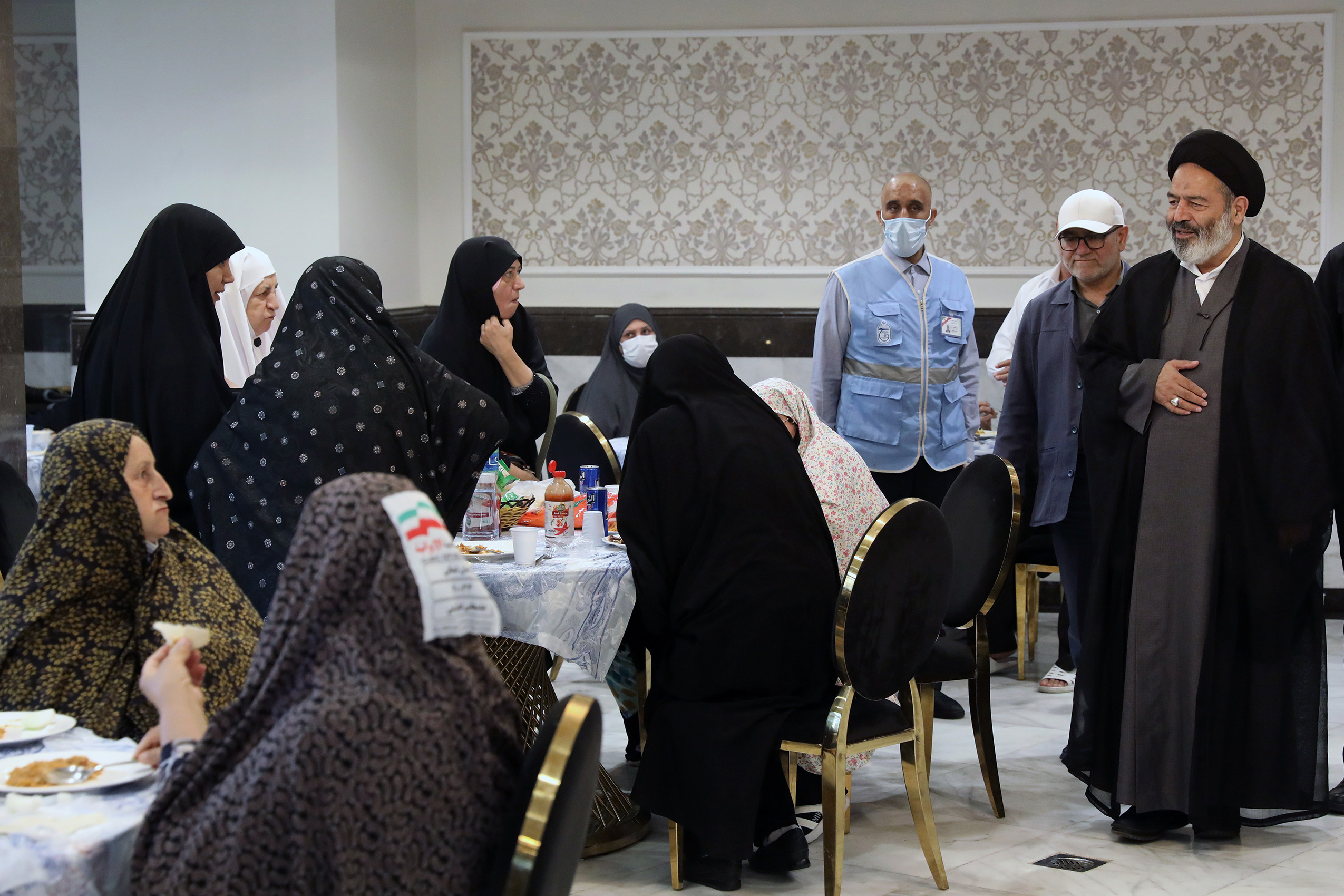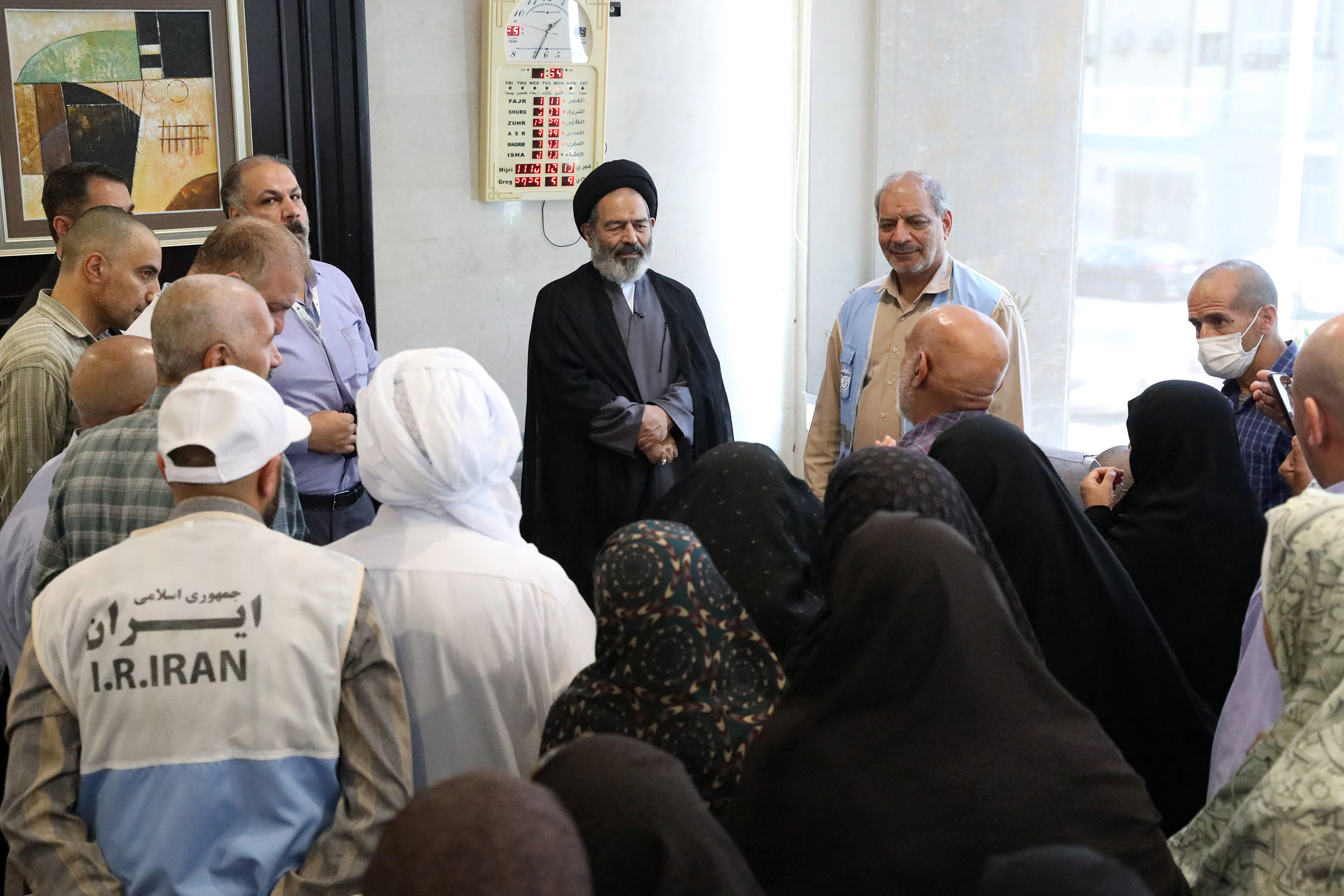Head of Iranian Pilgrims Holds Intimate Conversation With Pilgrims at Manar Tohid Hotel/Answers Questions and Appreciates the Performance of Officials
Referring to the process of selecting the caravan clerics, the head of Iranian pilgrims spoke of the sensitivity in ensuring their abilities and knowledge, and, praising the appointees, described the presence of these individuals in the caravans as a reason for greater satisfaction among the pilgrims.
According to Hajj Information Base, Hojjat al-Islam Seyed Abdolfattah Navvab, the representative of the Supreme Leader for Hajj and Pilgrimage Affairs and the supervisor of Iranian pilgrims, together with Mr. Alireza Bayat, the head of the Hajj and Pilgrimage Organization, continued his regular visits to hotels where Iranian pilgrims were accommodated.
On Thursday afternoon, Hojjat al-Islam Navvab visited the "Manar Tohid 2" hotel in Mecca and held a close conversation with Iranian pilgrims and learned about their issues and points of view.
At the beginning of this visit, the representative of the Supreme Leader for Hajj and Pilgrimage Affairs visited the restaurants of the women and men, inspected the quality of the food and hospitality provided, and attended the gathering of pilgrims and prayed for the acceptance of their deeds and Hajj.
The pilgrims welcomed the presence of the supervisor of Iranian pilgrims in their group and expressed their satisfaction with the quality of the food and hospitality.

During this visit, it was stated that some pilgrims are working in the restaurant as an honorary staff and are also performing their own acts and worships.
The head of the Iranian pilgrims then invited all pilgrims to return to the ground floor of the hotel for a discussion if they have any views or suggestions.
He also thanked the hotel staff and kitchen staff for their unwavering service and emphasized that they should appreciate this service.
Why the time of the caravans' presence varies from 29 to 41 days was one of the most frequently asked questions by pilgrims, and he attributed the reason to the representative of the Supreme Leader in Hajj affairs in response to the restrictions on aviation and Saudi airports, and emphasized that this issue was informed to the pilgrims before the trip and was also mentioned in paragraph 36 of the concluded contract.
One of the interesting points of this visit was the request of the pilgrims to convey their greetings to Ayatollah Khamenei, emphasizing the point that in the land of revelation, we are constantly remembering the Supreme Leader and his deputy.

Some pilgrims, referring to the limited space of the tents in Mina and Arafat, called for improving this restriction, to which the head of the Iranian pilgrims responded: Although we are aware of the difficult conditions of the pilgrims, this restriction applies to all pilgrims from all countries and is due to the limitations of the host. In addition, this year, the space per capita of each Iranian pilgrim has increased by a few percent compared to the previous year.
Some pilgrims also called for the presence of the caravan's clergymen with the pilgrims until the end of the journey and for them not to return to the Islamic homeland early. In addition, the female pilgrims, appreciating the caravan's leaders, called for an increase in their number due to their high impact and paving the way for responding to the rulings and carrying out the actions of the women in the caravans, especially considering that more than half of the Iranian pilgrims are women.
In this section, the head of Iranian pilgrims, referring to the process of selecting the caravan clergy, spoke of the sensitivity regarding ensuring their abilities and knowledge, and, praising the appointed officials, described the presence of these individuals in the caravans as a reason for greater satisfaction for the pilgrims.















